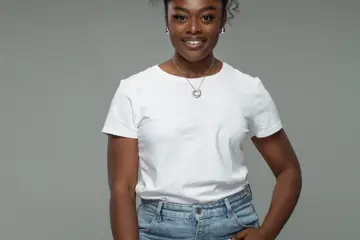Emiola has always understood the challenges Black children in care face when it comes to hair care. Growing up surrounded by foster children- her grandparents were foster carers - she witnessed firsthand the impact that poor hair and skin care can have on the physical and emotional wellbeing of Black and mixed heritage children.
Determined to make a difference, Emiola wanted to run events where foster carers could learn how to care for the hair and skin of children from heritages different to their own. She had the expertise to make it happen - she owns a hair salon and runs a business dedicated to supporting foster carers with Black hair care. But funding was a major hurdle.
So, you can imagine her surprise when she woke up one morning to find that a TikTok video she’d posted calling for support had raised everything she needed to get the event off the ground.
“It started with a client of mine,” Emiola said. “There's a lot of volunteering in Leicester and I told her ‘I really want to do this event. I don't know how it's going to happen because obviously it costs money, and I don’t have the spare money to do this all of the time. So what am I going to do?’
“She basically said why don’t you start a Go Fund Me and see if people will donate. As soon as I finished doing her hair, I sat down on my chair and was like, okay I’m going to post a Tik Tok.”
That TikTok changed everything. Emiola woke up to more than £4,000 in donations- enough to launch her first event. Weeks later, in February, over 100 hairdressers, foster carers, children, and young people gathered at The Afro Caribbean Centre in Leicester for the inaugural Crowned with Care event. The mission was simple: help Black and mixed heritage children in care feel good about themselves. And that’s exactly what they did.
Each child received a free hair appointment with a specialist in afro and curly hair, a box of hair products to take home (courtesy of Replenish), and access to educational sessions on hair and skin care. Foster carers joined in too, learning the basics of textured hair care so they could leave feeling confident and equipped to support their foster children.
The impact was immediate.
“I wish you could see the faces of these young people when even during getting their hair done and they can see it's coming out right, they’re trying to look in the mirror, their faces light up,” Emiola recalls.
“Especially the guys, they’ve got their trim, the braids, and you can see they’re absolutely feeling themselves. At both events I’ve cried because it’s just such an emotional thing to see.”
Beyond the physical transformations, something deeper happened – the children left with a sense of community. It was an unexpected but powerful outcome.
“A huge part that we didn't anticipate at the events is that we actually also create a community for the foster children. They were able to meet people like them and that was huge. That was really, really big.
“It was really, really important that they were able to understand that there's people like them.”
The success of the Leicester event led to another in London just weeks later, in April. Emiola’s work didn’t go unnoticed- she received the Volunteer Award at the BBC’s Make a Difference Awards.
Her motivation stems from personal experience. Being part of a fostering family, Emiola has seen how poor hair and skincare can affect black children in care.
Black and mixed heritage children are disproportionately represented in the care system, yet there’s a shortage of foster carers who can meet their cultural needs. A study by Barnardo’s found that isolation among black children in care was worsened by lack of access to personal care items and culturally familiar food. This made it harder for them to settle into new homes, and having to ask for basic necessities added another barrier to feeling safe and understood.
Emiola said: “My grandparents have cared for children of all heritages, but what we particularly noticed with the black children is the moment of relief when they realised they had black foster carers. It was like they were thinking ‘this person understands me’ – especially when they’ve been moved around and their hair is tangled and messy.
“Kids feel this, they noticed it. Especially at school, it’s when you’re at your most insecure, and you’re already in care.”
The emotional toll is real, Emiola adds.
“Life is difficult already, as a young person in care and add all of this on top, I can see how that over time, not feeling great about their hair could really, really chip away at how they feel about themselves.”
This is just the beginning of Emiola’s mission. She’s now conducting research into the effects of poor hair care on children in foster care, aiming to influence inclusion policies across fostering services.
“This is something I really want to address head on,” Emiola says.
“There's a huge gap. I think somebody needs to create something - so, why not me? Because I've worked with so many carers, I understand that they really want this, and we have to find a way.”
